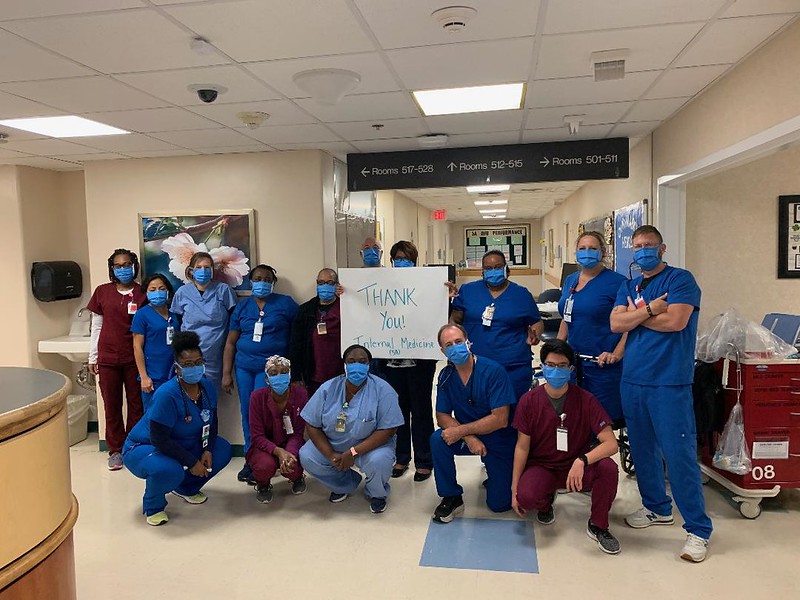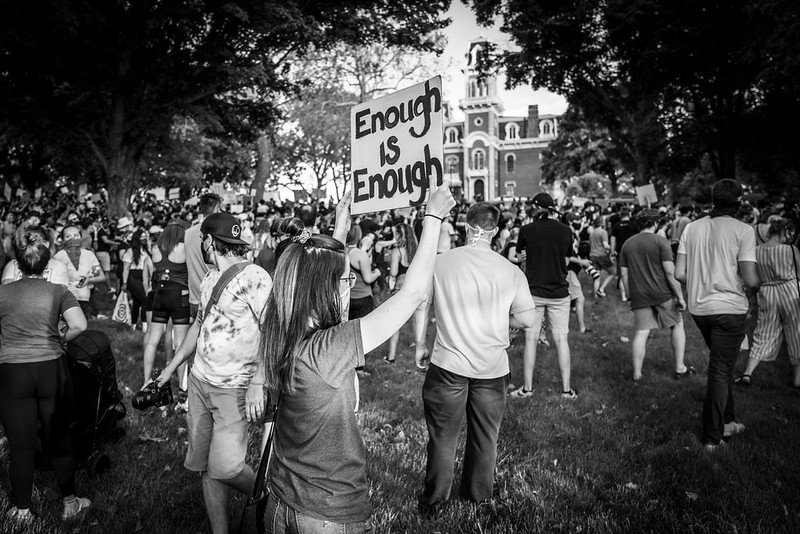Revised Common Lectionary Reflection, Fifth Sunday after Pentecost, Year A
July 5, 2020
Lessons: Zechariah 9:9-12; Psalm 145:8-14, Romans 7:15-25a; Matthew 11:16-19, 25-30

Theme: God’s faithful and generous people know to look for signs of Jesus everywhere. They know this because they have embraced the yoke of discipleship to faithfully follow the Christ into a broken, hurting, yet beautiful and surprising world.
Key Scripture: “But to what will I compare this generation? It is like children sitting in the marketplace and calling to one another, ‘We played the flute for you, and you did not dance; we wailed, and you did not mourn.’” Matthew 11:16-17
Maybe you, like me, have used these months of the COVID-19 pandemic to do some serious meditation, prayer, reflection, and wondering about where we’re headed—as a nation, as a church, as humans. This week I’ve been pondering how Jesus would respond to what’s going on. I’m sure his tweets and hashtags would have some bite to them. It’s really not that much of a stretch to see the parallels between first-century Palestine and the Roman Empire and our 21st century world. We’re seeing the best and worst of human behavior, just as Jesus saw in first-century Palestine. Power, greed, and polarization have been around as long as folks have been recording history. Just check out some of the Old Testament stories about God’s interaction with the beloved yet bullheaded people of Israel. Think of how plagues and natural disasters roll through like violent tides, reminding us that we are not in control and that our very existence is precarious and precious.
This week we find Jesus again teaching his disciples, trying to get them to see—really SEE—and understand just who he is and how that changes everything. In last week’s lesson (Matthew 10:40-42) Jesus flat out tells them that all-in discipleship is not a Sunday afternoon stroll but may pit them against the security of family bonds (crucial in his context), and it’s only in losing their life as they know it that they will truly find real, lasting life and Christ.

Before we enter the story in Matthew 11:16, John has sent his own disciples to ask if Jesus is the real deal. John is sitting in prison, so that may have been messing with his mind, but still … John doubts. Jesus sends them back with these words: “Go back and tell John what’s going on: The blind see, the lame walk, lepers are cleansed, the deaf hear, the dead are raised, the wretched of the earth learn that God is on their side” (Matt. 11:4-5, The Message). If even this cousin of Jesus — the one who baptized him and proclaimed his coming — doubts, then what do the disciples and the crowds think? What are they expecting? What are WE expecting as we emerge into a vastly different world in the shadow of COVID-19 and economic upheaval?
Jesus takes the crowd to task, asking if they are really listening to him and comparing them to “spoiled children whining to their parents.” He continues: “John came fasting and they called him crazy. I came feasting and they called me a lush, a friend of the riffraff. Opinion polls don’t count for much, do they? The proof of the pudding is in the eating” (Matt. 11:18-19, The Message).
Turning to our own current time of turmoil, what would Jesus say to a disgruntled crowd right now? “You were told to wear masks to help protect one another, and some of you called that crazy. You were told to keep your distance, and some of you whined that your rights were being violated. You were told to stay home and flatten the curve, but some of you — in your fear, discomfort, and inconvenience — began to clamor for quicker reopening and return to a normal that no longer exists. How’s that working for you?”
And then I suspect Jesus would take up with the folks from the Poor People’s Campaign and the Black Lives Matter protesters because we know from scripture that the Christ gravitates toward the margins, to happily hang out with “the wretched of the earth” as they learn that God is indeed for and with them. But that is not the end of the story, for we are all works in progress — even the most cantankerous and bellicose among us.
Yes! There’s more good news for all of us, from the inconvenienced, fearful, and grumpy to those who are Black, indigenous, or people of color still painfully bent under the weight of injustice, oppression, and white privilege, who cannot enjoy the fullness of life God desires for them. The good news is that Jesus calls all of us to life in him. There’s a place for you in Christ — and if we’re truly being the Body of Christ, there’s not just a place at the table but also a full plate of participation and inclusion in all aspects of life together.
My friends, this is an exciting and somewhat terrifying time to be the church. We are looking at a tsunami of change in our faith communities, culture, economy, everything. Sure, that’s scary, but Jesus calls us back to center. I can almost hear him saying, “Stop fussing and fretting and breathe. I am with you, and all shall be well. The world is about to turn.”
Yes! There is hope and good news hidden in plain sight. The Christ is with us, the Holy Spirit is ever-present, and God is willing love and blessing to this whole hurting world. All we have to do is look, listen, pay attention, and take one step after another into life abundant as a follower of Jesus. We can do this hard thing because the Holy Spirit won’t let us down. Our Lord himself says it best:

“Are you tired? Worn out? Burned out on religion? Come to me. Get away with me and you’ll recover your life. I’ll show you how to take a real rest. Walk with me and work with me—watch how I do it. Learn the unforced rhythms of grace. I won’t lay anything heavy or ill-fitting on you. Keep company with me and you’ll learn to live free and lightly” (Matt. 11:28-30), The Message.
Blessings on your continued faithful ministry, your creativity, and your willingness to lean into a new way of being church! Thank you for all that you continue to do and for the beloved children of God that you are.
In Worship
There’s a lot of focus on reopening houses of worship. How and when we begin to gather again matters because we are called to love God and neighbor, which means considering how we protect one another and make sure that all of us can participate in ways that are safe, healthy, and affirming. Need some solid backing from Martin Luther? Reread his Freedom of a Christian. You can access a copy online here.
In fact, there’s no better time to talk about our freedom as Christians and our responsibilities to God and one another. This Saturday we celebrate freedom as a nation. What does that mean for the Christian? Where are the guidelines? How are we different? If you can find ways to engage congregants in dialogue that may prove most fruitful. If you are not meeting in person yet, consider inviting various people to record short statements about what freedom in Christ means, what our freedom as a nation means, and where the two sometimes bump heads and ideologies. Freedom is nothing to take lightly, but until all of us are truly free, none of us is really fully free.
With Youth
Are your youth getting antsy at home, or are they finally beginning a return to some activities? How about a discussion on this week’s epistle lesson (Romans 7:15-25a)? Consider reading it from Eugene Peterson’s version, The Message. Invite conversation about how this passage is timely today, how we might recast Paul’s words for our lives, and how you’ve experienced what Paul talks about. How, then, does this passage find its very good news in this week’s gospel lesson (Matt. 11:16-19, 25-30)?
With
Children
This week’s focus verse is Psalm 145;8 – The LORD is
gracious and merciful, slow to anger and abounding in steadfast love.
This week’s psalm says some important things about God. It tells us how to respond to God, and it talks more about what God desires for all creation. I like this psalm because it reminds me how God is: slow to anger, gracious, merciful, abounding in steadfast love, good to all, and has compassion on all creation.
The psalm tells me that I should give thanks to God, I should be faithful and a blessing in God’s name, and I am to tell everyone about God and the good things God desires for all this world and everything in it.
Finally, in case I forget, this psalm reminds me that God lives forever and includes us into that forever, something we sometimes call heaven because we imagine that with God everything will be right, just and good. God is faithful, and the LORD lifts those who are falling down and raises up all who suffer.
The psalter, or Psalms, is an ancient worship book that connect us with worshipers from thousands of years ago. These beautiful songs tell us about God, remind us how to live and respond to God’s love, and show us all the emotions that people experience: joy, love, hope, pain, sadness, and fear. The psalms connect us to God and to one another.
What did you learn from this psalm today?
Finish with a simple echo prayer and blessing.
Dear God (Dear God),
Thank you (Thank you) for being you (for being you). Thank you loving us (Thank you for loving us). Help us to love you more (Help us to love you more), and to share the good news (and to share the good news) of Jesus (of Jesus). Keep us from fear (Keep us from fear). Keep us hopeful. (Keep us hopeful). Make us helpful (Make us helpful). Give us peace (Give us peace). Amen (Amen).
Weekly
Stewardship Bulletin Insert
This week we give thanks for the freedoms we enjoy in our
country and as beloved children of God. One of our great freedoms is that of a
generous heart and spirit in response to God’s amazing love and grace. Thank
you for continuing to support our ministries and programs so that we can be
there to love and support our neighbors.
Stewardship at Home
Spend some time this week with the epistle lesson. Read it in several different translations, if possible. How do you understand Paul’s struggle and his teaching? Do you experience this struggle in your own life? How do you cope? How to you reconnect to what matters and refocus on God’s will for your life? How might the struggle between sin and the desire to follow Jesus manifest itself in our current situation with COVID-19, racism, and violence?
Do you have a small group or accountability partner with whom you might discuss these questions and Paul’s message? If not, perhaps this is a good time to start a small group in your faith community. Would you be willing to take a lead role in something like this?
2017 Reflection: https://www.stewardshipoflife.org/2017/07/life-saver-or-life-savior/
2014 Reflection: https://www.stewardshipoflife.org/2014/07/the-soul-whisperer/
Images: steve p2008 Backbone Campaign, and Phil Roeder, Creative Commons usage license. Thanks!
Note: Reprint rights granted to congregations and other church organizations for local, nonprofit use. Just include this note: “Copyright (c) 2020, Rev. Sharron Blezard. Used by Permission.” Other uses, please inquire: thewritelife@hotmail.com.



Leave a Reply